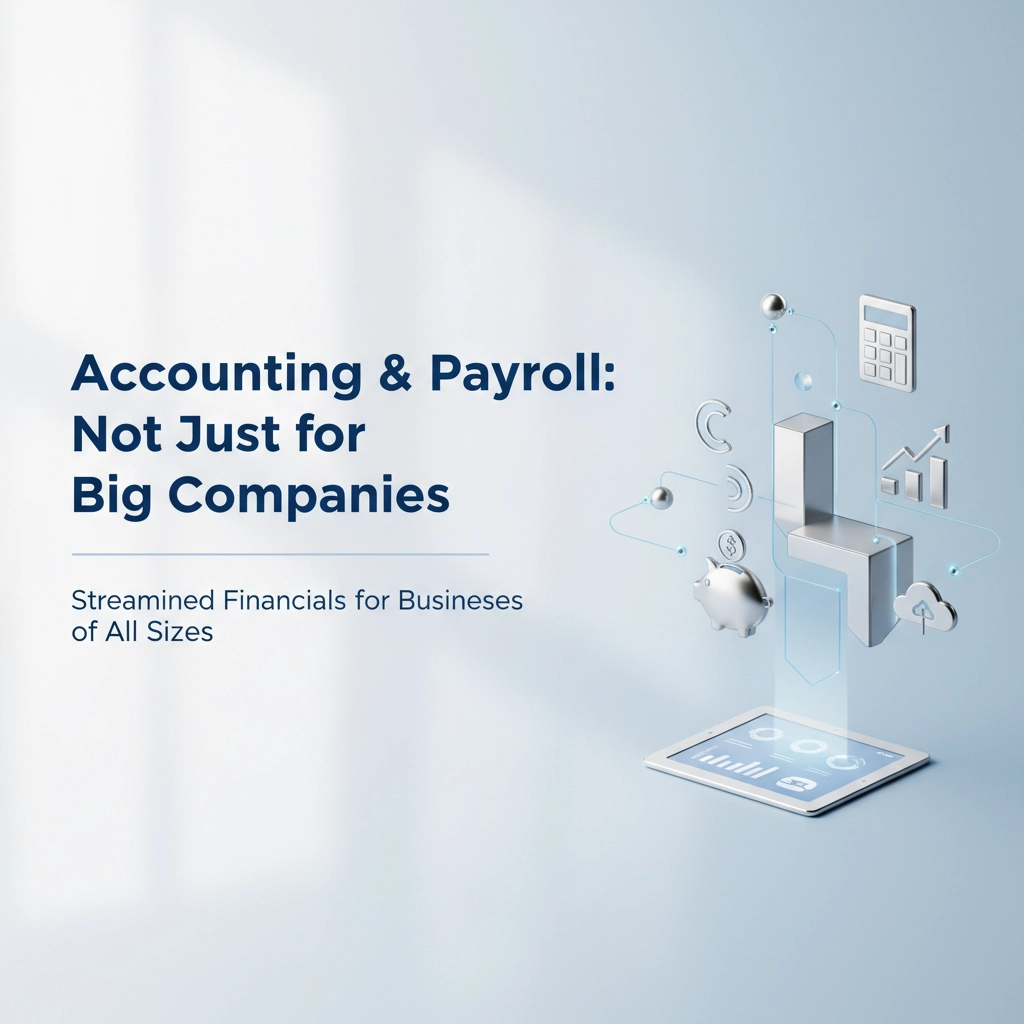
There's this persistent myth floating around that professional accounting and payroll services are only for Fortune 500 companies with deep pockets and complex operations. If you're running a small or medium-sized business, you might think these services are overkill – something you'll "graduate to" once you hit a certain revenue threshold or employee count.
Here's the truth: that thinking could be costing you time, money, and quite possibly your sanity.
Let's paint a picture. You're a small business owner juggling everything from customer service to inventory management. Come payday, you're hunched over spreadsheets at 11 PM, trying to calculate taxes, deductions, and compliance requirements. Sound familiar?
Processing payroll manually might seem like a money-saving move, but it's often a false economy. Between federal taxes, state taxes, local taxes, wage garnishments, and ever-changing compliance requirements, payroll has become incredibly complex – even for businesses with just a handful of employees.

Consider this: a single payroll mistake can result in penalties from the IRS, state agencies, or labor departments. These penalties don't scale down just because you're a small business. A $500 penalty hits a 5-person company much harder than a 500-person corporation.
Then there's the time factor. Every hour you spend wrestling with payroll calculations or trying to figure out quarterly tax filings is an hour not spent growing your business. When you're wearing multiple hats as a business owner, that opportunity cost adds up quickly.
The beauty of modern accounting and payroll services is that they've been specifically designed with small and growing businesses in mind. These aren't watered-down versions of enterprise solutions – they're purpose-built tools that recognize the unique challenges smaller operations face.
Take payroll processing for companies with 1-19 employees. Professional services handle everything from automatic tax calculations based on employee locations to managing federal and state unemployment tax returns. They interpret wage garnishment orders, track vacation accruals, and ensure compliance with local labor laws that vary dramatically from city to city.
But the benefits extend far beyond just getting paychecks out on time. Professional accounting services provide the financial visibility that small businesses desperately need but rarely have. Instead of flying blind between quarterly reviews, you get real-time insights into cash flow, expenses, and profitability.

This visibility becomes crucial when making business decisions. Should you hire another employee? Can you afford that new equipment? Is that marketing campaign actually generating ROI? With proper accounting in place, these decisions become data-driven rather than gut-feeling gambles.
Small businesses have more choices than ever when it comes to handling accounting and payroll. You don't have to choose between doing everything yourself or signing up for an expensive enterprise package.
In-house processing works for some businesses, but it requires significant time investment and ongoing education to stay compliant with changing regulations. It might make sense if you have someone on staff who genuinely enjoys this work and has the expertise to do it correctly.
Working with a bookkeeper or accountant brings professional expertise to your financial management. Accountants offer broader financial guidance, helping with everything from tax preparation to strategic financial planning. They're ideal for businesses that need comprehensive financial oversight and planning.
Dedicated payroll providers specialize in the nitty-gritty details of payroll processing. They excel at maintaining compliance with constantly evolving regulations and can handle complex situations like multi-state employees or intricate benefit structures.
Professional Employer Organizations (PEOs) take things a step further, essentially co-employing your staff and handling HR, benefits, and compliance alongside payroll. This can be particularly valuable for small businesses that want to offer competitive benefits packages typically available only to larger companies.
Here's where things get really interesting for small businesses: integrated accounting and payroll services. Instead of juggling separate providers for different functions, you get everything under one roof.

The cash flow visibility alone is game-changing. When your payroll data flows directly into your accounting system in real-time, you always know exactly where your finances stand. No more waiting until month-end to discover that payroll expenses put you dangerously close to your credit limit.
Integration also eliminates the coordination headaches that come with multiple providers. When issues arise – and they will – you're not playing phone tag between your accountant and payroll company trying to figure out who's responsible for what. One team handles everything, which means faster resolution and fewer finger-pointing scenarios.
The error reduction is significant too. When data flows automatically between systems instead of being manually entered multiple times, the chance of transcription errors drops dramatically. Small discrepancies get caught early and corrected before they become major headaches.
Don't assume that smaller providers lack sophisticated technology. Many integrated accounting and payroll services offer tools that rival or exceed what the big national brands provide, but without the bloat and unnecessary features that drive up costs.
Modern small business solutions typically include employee self-service portals where staff can access pay stubs and tax documents, automated tax filing and reporting that happens behind the scenes, online onboarding systems that get new hires set up quickly, and integration with point-of-sale and time tracking systems you might already be using.
The key difference is getting precisely the tools you need without paying for extras like investment products, insurance programs, or enterprise features that don't apply to your business. It's technology that scales with your needs rather than overwhelming you with capabilities you'll never use.

Let's address the elephant in the room: cost. Many small business owners assume professional accounting and payroll services are prohibitively expensive. The reality is more nuanced.
Yes, you'll pay more upfront than handling everything yourself. But consider the hidden costs of the DIY approach: your time (valued at whatever you could be earning by focusing on revenue-generating activities), potential penalties from errors, missed tax deductions, and the opportunity cost of not having real-time financial insights to guide business decisions.
Most small business services use transparent, predictable pricing models. You typically pay a base fee plus a per-employee charge for payroll, with accounting services either bundled in or available as an add-on. This predictability makes budgeting easier and eliminates surprise charges.
Many businesses find that the time savings alone justify the cost. When you factor in reduced stress, improved accuracy, and better financial visibility, professional services often pay for themselves through improved business performance.
If you're ready to move beyond DIY accounting and payroll, the transition is typically smoother than you might expect. Most providers handle the heavy lifting of data migration and system setup, often completing the process within a few weeks.
During the transition, you'll work with a dedicated team to ensure nothing falls through the cracks. They'll verify employee information, set up direct deposit, configure tax withholdings, and establish reporting preferences. Most services also provide training to ensure you're comfortable with any new systems or processes.
The immediate benefits usually become apparent within the first pay cycle. Business owners frequently report feeling immediate stress reduction, increased confidence in their financial numbers, and newfound time to focus on business growth rather than administrative tasks.
Professional accounting and payroll services aren't luxury items reserved for big corporations – they're practical business tools that help companies of all sizes operate more efficiently and effectively. The myth that these services are "too much" for small businesses has prevented countless entrepreneurs from accessing resources that could significantly improve their operations and peace of mind.
Whether you choose a dedicated payroll provider, work with an accountant, or go with an integrated solution, the key is recognizing that professional financial management isn't about business size – it's about business success. Your company deserves the same level of accuracy, compliance, and financial insight that larger businesses take for granted.
The question isn't whether your business is big enough for professional accounting and payroll services. The question is whether you can afford to keep going without them.